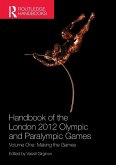Managing Major Sports Events: Theory and Practice is a complete introduction to the principles and practical skills that underpin the running and hosting of major sports events, from initial bid to post-event legacy and sustainability.
Now in a fully revised and updated new edition, the book draws on the latest research from across multiple disciplines, explores real-world situations, and emphasises practical problem-solving skills. It covers every key area in the event management process, including:
- Bidding, leadership, and planning;
- Marketing and human resource management;
- Venues and ceremonies;
- Communications and technology (including social media);
- Functional area considerations (including sport, protocol, and event services);
- Security and risk management;
- Games-time considerations;
- Event wrap-up and evaluation;
- Legacy and sustainability.
This revised edition includes expanded coverage of cutting-edge topics such as digital media, culture, human resources, the volunteer workforce, readiness, security, and managing Games-time. Each chapter combines theory, practical decision-making exercises, and case studies of major sports events from around the world, helping students and practitioners alike to understand and prepare for the reality of executing major events on an international scale. Also new to this edition is an "Outlook, Trends, and Innovations" section in each chapter, plus "tips" from leading events professionals.
Managing Major Sports Events: Theory and Practice is an essential textbook for any course on sports event management or international sports management, and an invaluable resource for all sport management researchers, practitioners and policymakers.
Online resources include PowerPoint slides, multiple choice questions, essay questions, stories, and decision-making exercises.
Now in a fully revised and updated new edition, the book draws on the latest research from across multiple disciplines, explores real-world situations, and emphasises practical problem-solving skills. It covers every key area in the event management process, including:
- Bidding, leadership, and planning;
- Marketing and human resource management;
- Venues and ceremonies;
- Communications and technology (including social media);
- Functional area considerations (including sport, protocol, and event services);
- Security and risk management;
- Games-time considerations;
- Event wrap-up and evaluation;
- Legacy and sustainability.
This revised edition includes expanded coverage of cutting-edge topics such as digital media, culture, human resources, the volunteer workforce, readiness, security, and managing Games-time. Each chapter combines theory, practical decision-making exercises, and case studies of major sports events from around the world, helping students and practitioners alike to understand and prepare for the reality of executing major events on an international scale. Also new to this edition is an "Outlook, Trends, and Innovations" section in each chapter, plus "tips" from leading events professionals.
Managing Major Sports Events: Theory and Practice is an essential textbook for any course on sports event management or international sports management, and an invaluable resource for all sport management researchers, practitioners and policymakers.
Online resources include PowerPoint slides, multiple choice questions, essay questions, stories, and decision-making exercises.
'Having participated in Major Games from idea to bid, from selection through transition to organizing, and from organizing to delivery and legacy, I highly recommend this text to all those associated in any way with a major sport event who wish to inform themselves with regard to the entirety of the Games journey. For those contemplating the pursuit of a major sports event, the road ahead is laid out for you. And for those wishing to study the pursuit and hosting of major sports events, it's all to be found in detail in this work.'
Michael Chambers, Maclaren Corlett, Canada
Michael Chambers, Maclaren Corlett, Canada









